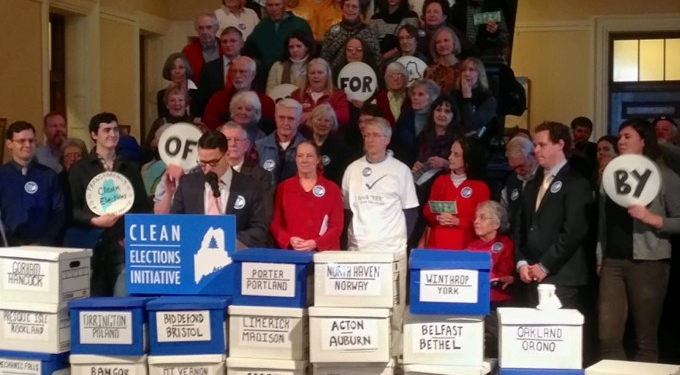
By Frances Moore Lappé | Common Dreams
In earlier reflections on hope, I’ve declared that hope isn’t an assessment, it’s a stance toward life. Now I want to convince you that in this stance I’m on really solid ground.
I start with an observation about our species. We humans have been around long enough to know one thing for sure about ourselves: It is not the magnitude of a challenge that crushes the human spirit. It’s feeling powerless that does us in, for humans are problem solvers. We like to get things done.
So, here’s my big claim: Time and again humans have stepped up with grit and even glory to accomplish what seemed to be impossible.
And what may seem impossible right now? Well, for one, democracy in America in which we each have a real voice.
In today’s America, social scientists’ hard data reveal that there is “near zero” relationship between what most Americans want and public policies Congress enacts. By contrast, they find a strong correlation between what is desired by the wealthy minority and choices made in Washington.
With the bedrock of democracy so violated, what does it take for citizens to step up? Well, here’s my second claim: All it takes for humans to leap into action is that enough of us believe just three things, each based in real evidence.
One. That our cause—in this case, democracy—is essential. Just as a parent would rush into a burning building if necessary to save a child, we must believe that our action for democracy is the only way to achieve democracy, without which we can’t tackle life-destroying climate change, deepening economic inequality, and so much else.
Two. That success is at least possible. Certainty is not required.
Three. That we ourselves can make a difference.
And guess what? Right now, in our struggle for real democracy, more and more of us embrace these truths, and with good evidence.
Let’s look at each.
One. Democracy is essential to meeting our biggest threats.
Why? Because it’s the only form of governance proven capable of creating the conditions shown over our long history to bring out the best within us while keeping the worst in check. Those conditions are: the wide dispersion power, transparency in public affairs, and an ethic of mutual accountability in which know we’re all on the hook—the opposite of today’s endless blame game.
As often is the case when faced with loss, Americans increasingly appreciate the necessity of these three positives as their opposites are so evident and surging.
Second. Democracy is possible.
Of course, I do not mean perfect democracy, but democracy as an unending journey toward the ever-greater realization of these three conditions.
And how do we know? So much evidence ….
In America, in earlier decades when big money had much less power over our democracy—from the 40s to the 70s—our nation created new tools to protect the environment, such as the EPA, and new rules to protect civil rights and dignity. During these decades we all gained economically as well, not just the elite as is true today. Median household income doubled, but the poorest families gained the most.
Other evidence?
We know that it’s possible to achieve advances in democracy by simply looking abroad. In measures of electoral integrity, dozens of nations score higher—some much higher—than we do. In creating fair voting districts (the opposite of gerrymandering), for example, virtually every country in the world ranks higher than the US. Only Malaysia is rated below us.
Such findings are upsetting; yet, infinitely more discouraging would be to learn that the US scores high when we know the reality is so bad. The very fact that others are doing so much better itself proves possibility.
Finally, the third requirement for hope? That we know we ourselves can make a difference.
Check! Here, too, is strong evidence.
Today, a citizens’ movement is already offering proof that we each can contribute to achieving effective system reforms. Because years ago citizens in Maine, Arizona, and Connecticut stepped up to pass public financing for qualified candidates in state races, two-thirds or more of legislators in Maine and Connecticut today have not had to depend on big private donors to win their seats. And, similar approaches are working elsewhere, including New York’s City Council. A national version, introduced by (D-MD) John Sarbanes, has 162 House cosponsors.
Plus, thirteen states and the District of Columbia have authorized Automatic Voter Registration, making it possible for more people to register and therefore to vote. In addition, six states have charged independent redistricting commissions with the job of replacing rigged district lines with those moving voters toward the status of “equal citizens” that we’ve been taught to believe democracy promises us.
There we have it. Grounds are forming for each of the three realizations most humans need for eyes-wide-open hope triggering heroic action. More and more of us now appreciate that democracy is essential. It is possible, and, our actions do count, big time, in the rising Democracy Movement.
So, now’s our chance. Just as humanity has done time and again, we can become heroes to ourselves, and what could feel better than that?
And don’t miss watching the companion video to this article – one of Frances Moore Lappé’s Thought Sparks Video Series in which she opens her heart about what fortifies her in this scary time. Each week for nine weeks or more, her Small Planet Institutewill release an informal 2-to-5-minute video in which Frances shares her often-surprising, liberating takes on hope, democracy, and courage.
This work is licensed under a Creative Commons Attribution-Share Alike 3.0 License















![Everything You Ever Wanted to Know About 9/11 Conspiracy Theory in Under 5 Minutes [VIDEO] | by James Corbett](https://consciouslifenews.com/wp-content/uploads/2018/09/911-a-conspiracy-theory-120x86.jpg)
